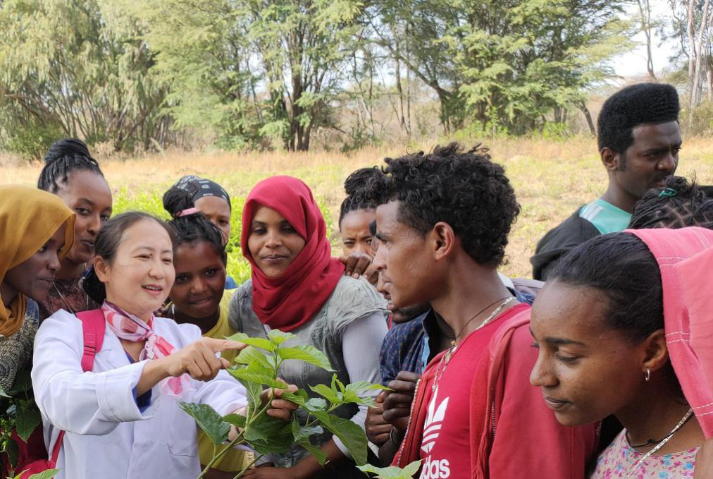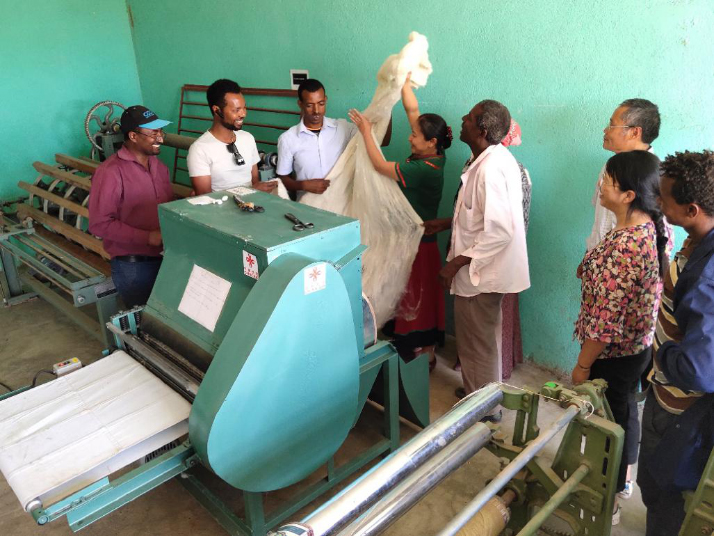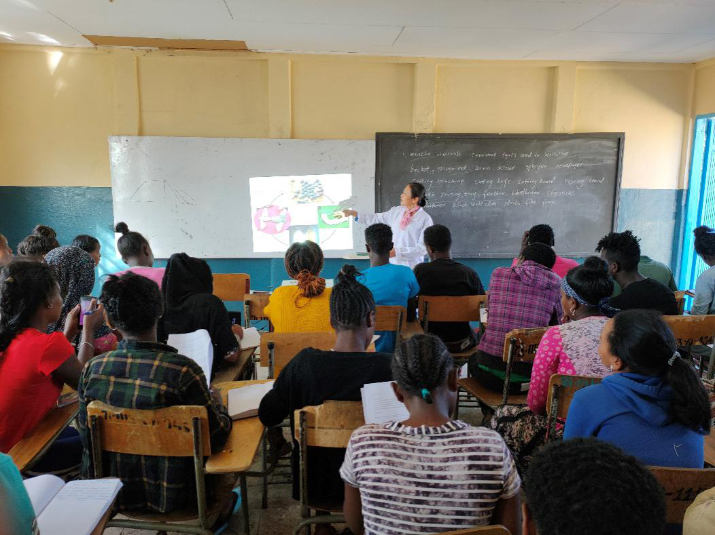|
||||||||||
| Home Nation World Business Opinion Lifestyle ChinAfrica Multimedia Columnists Documents Special Reports |
|
||||||||||
| Home Nation World Business Opinion Lifestyle ChinAfrica Multimedia Columnists Documents Special Reports |
| ChinAfrica |
| Dedicated to Vocation |
| A Chinese agricultural teacher pursues her passion to promote sericulture in Ethiopia |
| By Li Jing | VOL.12 March ·2020-03-09 |

Chen Xiongzhen imparts applied knowledge to her Ethiopian students (COURTESY PHOTO)
Chen Xiongzhen, 53, is a single mother and an expert in agricultural vocational training. Since October 15, 2019, she has been working in Ethiopia as a member of China-Ethiopia ATVET program, where she would stay for a period of nine months. This is the fifth time that Chen has taken part in this kind of education exchange program between China and Ethiopia.
Chen is from the Huanjiang Maonan Autonomous District in the Guangxi Zhuang Autonomous Region, known in China for its high-quality cocoon production. After graduating from the Guangxi University of Agriculture in 1990, she pursued a career in sericulture, eventually becoming a senior expert in the field and deputy director of her home district's agriculture and rural affairs bureau. In 2015, however, she decided to devote herself to agricultural technical vocational education in Africa.
Chen is proud of her decision, although she does not hide her feeling of guilt for having stayed away from her son so often during the past five years. "I am a teacher, but also a mother," she said remorsefully.
Far from sight, close to heart
"Before I left for Africa to take part in this project, what made me hesitate the most was my only son," Chen told ChinAfrica.
Although she was full of enthusiasm for her mission, as a mother, the greatest difficulty for her was being far away from her son. Back in November 2015, she was selected as a member of the 16th China-Ethiopia ATVET program because of her outstanding professional skills. At the time, her 17-year-old son had just entered the third year of high school and was preparing for the college entrance exam in June of the following year.
"As a mother, it was my duty to stay by his side and help him take on the first big challenge of his life. However, as an expert, it was my responsibility to participate in the program to serve my country. Taking part in this project meant that I couldn't take care of him while he was preparing for the exam, nor could I send him off to university. So I had to get my son's consent beforehand." What she didn't expect was that the boy was actually very understanding of his mother. Though he was initially a bit reluctant, he never complained, and even comforted her: "I will live in school and go to my grandparents during the holidays. Don't worry about my studies and me," he told her.
Chen was very proud of her son's maturity and optimism. "After all, a child has to go his own way. I just hope to continue to sow seeds of love in his heart, so that he can learn to take care of others. His good physical and mental health soothes my regrets and my guilt toward him."
Besides her son, she missed her elderly parents as well. "Fortunately, my sister and brother could take care of them. Although they feared that I would suffer for staying far away from my native country, they never tried to stop me from leaving." Her family's understanding and support gave Chen all the courage she needed to answer her calling in Africa.

Chen Xiongzhen (second right) processes silk using a machine (COURTESY PHOTO)
Overcoming difficulties
On October 15, 2019, Chen and 19 other Chinese instructors arrived in Ethiopia. While one of the teachers was assigned to work in the Ministry of Agriculture of Ethiopia, all the others were sent to teach in three local agricultural colleges - 11 at Alage ATVET College, six at Agarfa ATVET College and two at Holeta ATVET College. Chen went to Alage Atvet College, about 300 km from Addis Ababa, the nation's capital.
Difficulties arose soon after her arrival. Power and Internet outages were among the most serious ones. On the one hand, this prevented her from communicating with her family, sometimes even for over a month. She could only call home occasionally. On the other hand, as an instructor, Chen had to have access to the Internet to prepare her lectures and conduct demonstration class for her students.
In addition, according to Chen, the main problem in agricultural technical vocational agricultural education and training in Ethiopia is a lack of systematic teaching materials and practice opportunities. To fill this gap, Chen and her Chinese colleagues co-compiled teaching materials and textbooks, reinforced classroom teaching through demonstrations and set up practice bases, in order to improve students' applied skills. As an expert in silkworm farming and mulberry cultivation, Chen was mainly responsible for teaching courses on mulberry tree planting and maintenance, silkworm reproduction, the techniques to dry and process cocoons, as well as the control of mulberry and silkworm diseases.
"These applied techniques can play an essential role in training sericulture technicians and workers, promoting the development of Ethiopian sericulture, and increasing the income of local residents," she said.

Chen Xiongzhen has completed 430 hours of theoretical and practical instruction in Ethiopia since 2015 (COURTESY PHOTO)
Training more talents
"It takes 10 years to grow a tree, but a hundred years to train talented men. Education is a long-term process, but it is very important. We must have the patience to cultivate talents that are truly useful for the development of Ethiopian agriculture," Chen said. During her time in Ethiopia, she was able to select varieties of silkworm suitable for the local climate. She also managed to popularize comprehensive disease prevention and cocoon harvesting techniques. In addition, she taught her students techniques to process silkworm cocoons, allowing Ethiopians to produce their own silk products.
Her work has been highly praised by her Ethiopian colleagues. "She is amazing, and has done a great job! This is fantastic, we have never achieved such great success in producing mulberry cocoons," said Kathy Marshall, General Manager at Sabahar, the flagship of Ethiopian sericulture industry.
Since Chen first came to Ethiopia in 2015, she has completed 430 hours of theoretical and practical instruction for 617 students. She has revised and expanded the textbooks, adding practical techniques to make it easier for her students to understand and learn. She also trained a total of 993 Ethiopian instructors, development agents and farmers.
"She is the best teacher with a big loving heart, we all enjoy her teaching," said Tigist Silas Dangaro, one of Chen's students. As proof, during each of her four previous field missions in the country, she received an award from the Ethiopian Ministry of Agriculture for her exceptional contribution.
In Ethiopia, there are many Chinese instructors like Chen. Since the signing of an agreement on agricultural education personnel exchange between China and Ethiopia in 2001, a total of 485 Chinese instructors have gone to Ethiopia and have trained nearly 60,000 Ethiopian instructors, students, agricultural development agents and farmers, with some 70 new techniques and 56 training courses in relevant agricultural fields introduced and completed. These instructors have set up a professional education system in Ethiopia, effectively promoting the development of local agricultural techniques.
(Comments to lijing@chinafrica.cn)
| About Us | Contact Us | Advertise with Us | Subscribe |
| Copyright Beijing Review All rights reserved 京ICP备08005356号-5 京公网安备110102005860号 |